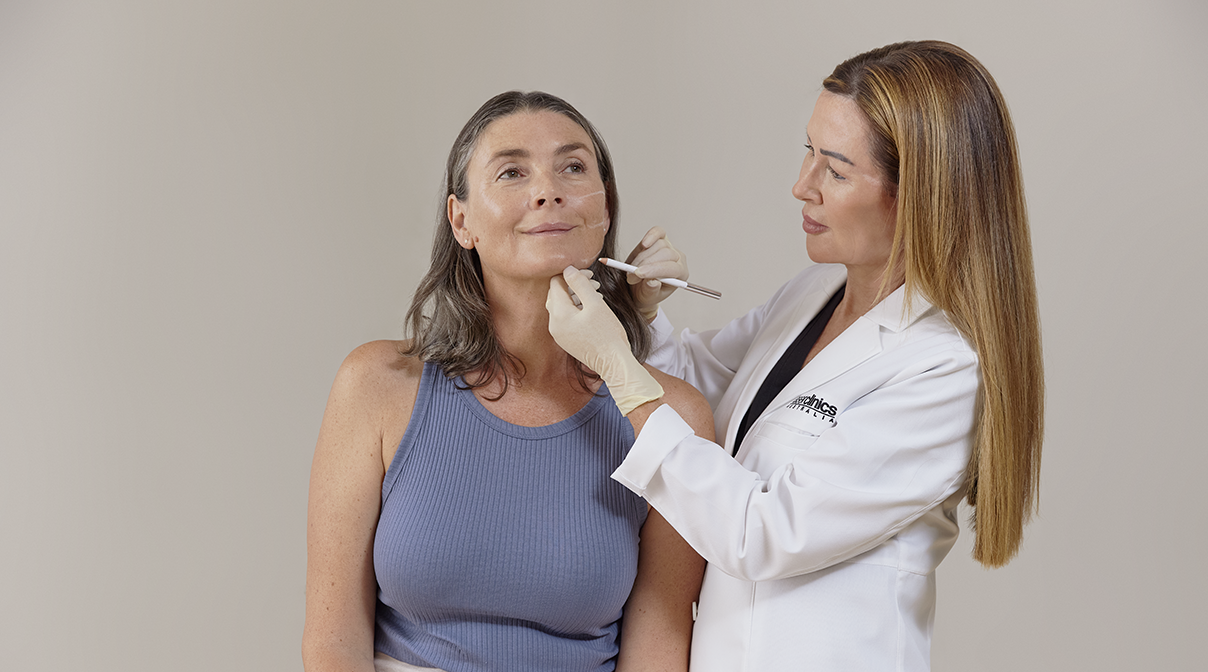If your skin constantly feels tight, flaky, or irritated no matter how much you moisturise — you’re not imagining it. Chronic dryness can be more than just a seasonal annoyance or a skipped moisturiser.
In many cases, there’s a deeper reason your skin isn’t holding onto hydration the way it should. Below, we break down the most common causes of really dry skin.
Genetics
Some people are simply born with skin that struggles to stay hydrated. One key reason? Filaggrin, a protein essential for maintaining a strong skin barrier. Mutations in the gene that produces it can lead to skin that loses moisture easily and is more prone to irritation — a known factor in conditions like atopic dermatitis.
Even without visible flare-ups, this genetic trait can cause skin to feel rough, tight, or sensitive, particularly in colder climates or after using harsh products. And because compromised skin may also trigger more nerve activity, it can make dryness feel itchier and more uncomfortable than it actually looks.
Thyroid Issue
Hypothyroidism, or an underactive thyroid, is a lesser-known but common cause of persistently dry skin.
When thyroid hormone levels drop, your skin’s ability to regulate oil and cell turnover slows down. The result? Skin that becomes coarse, dull, and rough in texture — sometimes even thickened or scaly. It’s especially noticeable on areas like the elbows, shins, and hands. In some cases, you might also notice brittle nails, hair thinning, or a pale, washed-out complexion.
Because the skin is highly responsive to hormonal shifts, persistent dryness alongside other signs like fatigue, weight changes, or sensitivity to cold may be worth flagging with your GP for a simple thyroid function test.
Harsh Soaps or Fragrance-Containing Products
Many soaps, cleansers, and body washes are packed with ingredients that strip the skin’s natural oils and disrupt the protective barrier that keeps moisture and irritants out.
Common culprits include:
- Sodium lauryl sulfate (SLS) and sodium laureth sulfate (SLES): These are foaming agents found in many facial cleansers and body washes. They’re highly effective at removing oil — a little too effective.
- Alcohol denat or isopropyl alcohol: Often used in toners or acne treatments, these can evaporate quickly and pull moisture from the skin as they go.
- Essential oils (like citrus, eucalyptus, peppermint): Natural doesn’t always mean gentle. These can be sensitising and contribute to transepidermal water loss (TEWL), leaving skin even drier.
Poor Diet
A lack of proper nutrients can disrupt your skin’s ability to retain moisture and make it more prone to irritation, flakiness, and a tight, uncomfortable feeling.
Omega-3 fatty acids, especially ALA (alpha-linolenic acid), DHA, and EPA, play a crucial role in skin barrier function. They help regulate inflammation, support the production of ceramides, and influence filaggrin expression — a key protein that keeps the skin’s structure intact.
To support skin health from the inside out, look to foods naturally rich in omega-3s, such as:
- Fatty fish like salmon, mackerel, and sardines
- Flaxseeds and chia seeds
- Walnuts
- Seaweed and algae (especially for plant-based DHA)
- Hemp seeds and canola oil
That said, before making major dietary changes or adding new supplements, it’s best to speak with a qualified nutritionist or dietitian — especially if you have allergies or medical conditions.
Long, Hot Showers
Excessive exposure to hot water can weaken your skin barrier, leaving it drier and more irritated over time. Hot water increases transepidermal water loss (TEWL), disrupts pH balance, and can even trigger redness and inflammation.
If you’re dealing with chronic dryness, you might want to reconsider how you shower. Dial down the heat, keep your showers under 10 minutes, and use lukewarm water instead. Over-showering (especially more than once a day) can make things worse, so aim for frequency that respects your skin’s natural rhythm.
Smoking
We all know smoking isn’t great for anyone — and your skin doesn’t get a pass either. Besides the usual health concerns, research suggests that smoking (both firsthand and secondhand) may increase your risk of developing inflammatory skin conditions like atopic dermatitis, a common cause of chronic dryness.
Why? Cigarette smoke generates reactive compounds that impair the skin barrier and push inflammation into overdrive. It makes your skin much drier, slower to heal, and more sensitive.
If quitting feels overwhelming, know this: every step you take toward reducing exposure helps — for your skin and your overall health.
Hard Water
If you’ve moved recently and your skin suddenly feels drier or more irritated — and nothing else has changed in your routine — your tap water might be worth a second look.
Hard water contains higher levels of minerals like calcium and magnesium. These minerals can interact with soaps and cleansers and make them less effective and more difficult to rinse off. The residue left behind can disrupt the skin’s pH, strip natural oils, and weaken skin barrier.
That said, this isn’t a universal rule. Not everyone reacts the same way. In fact, some people find that their skin tolerates or even prefers hard water, especially when paired with gentle, pH-balanced cleansers.
Still, if you're dealing with stubborn dryness or sensitivity and can't trace the cause, considering the mineral content of your water — especially after a move — could be a smart next step. A simple home water test or using a shower filter might help identify whether water hardness is contributing to your skin issues.
So, What Can You Do About Really Dry Skin?
Dry skin isn;’t something you’re stuck with forever, but it does require a little more strategy than just slapping on some lotion and hoping for the best. Here are some tips that might help turn things around:
Stick to Gentle, Barrier-Friendly Products
Switch to a fragrance-free, soap-free cleanser—one that won’t strip your skin of its natural oils. Colloidal oatmeal cleansers and body soaps are especially good for dry, sensitive skin.
Moisturise—But Do It Right
Timing matters. Apply your moisturiser immediately after stepping out of the shower, when your skin is still slightly damp. Skip the towel-dry and go straight for your product. Look for formulas rich in ceramides, glycerin, shea butter, or squalane, and avoid anything with alcohol or synthetic fragrance, which can make dryness worse.
Layer Hydration, Not Just Moisture
Moisturiser is just one part of the equation. You can also work in hydrating serums that contain hyaluronic acid, panthenol, or niacinamide.
These ingredients attract and hold water in the skin. A good routine might start with a hydrating mist or essence, followed by your serum, then a moisturiser to lock it all in.
Professional Treatments That Can Help
Professional treatments can help reset and deeply nourish dry, dull, or flaky skin. Here are a few options worth discussing with a Skin Therapist:
- Microdermabrasion: A gentle exfoliating treatment that buffs away dead skin cells, allowing your products to penetrate better and improving texture over time.
- Facial Treatments: A tailored facial using hydrating masks, LED light, or lymphatic massage can help boost circulation and deliver targeted moisture deep into the skin.
- Cosmetic-Grade Chemical Peels: When done with the right acids (like lactic or mandelic acid), peels can gently exfoliate while also improving your skin’s ability to retain moisture.
Skin Needling (Microneedling): Helps stimulate collagen and improves absorption of hydrating serums. Some formulations even focus on restoring barrier function and moisture retention.
Final Thoughts
From genetics to the environment, there are layers of influence that go beyond basic skincare routines, which may affect skin dryness.
The key is learning to read your skin, not just react to it.
If you’ve tried it all and nothing seems to stick, it might be time to get expert eyes on the issue. A personalised consultation with a qualified Skin Therapist at Laser Clinics Australia can help you decode what’s really going on and build a treatment plan just for your skin.











